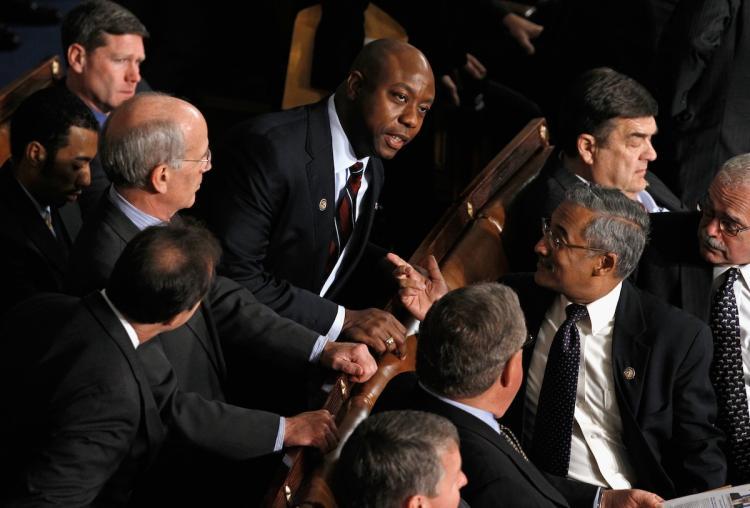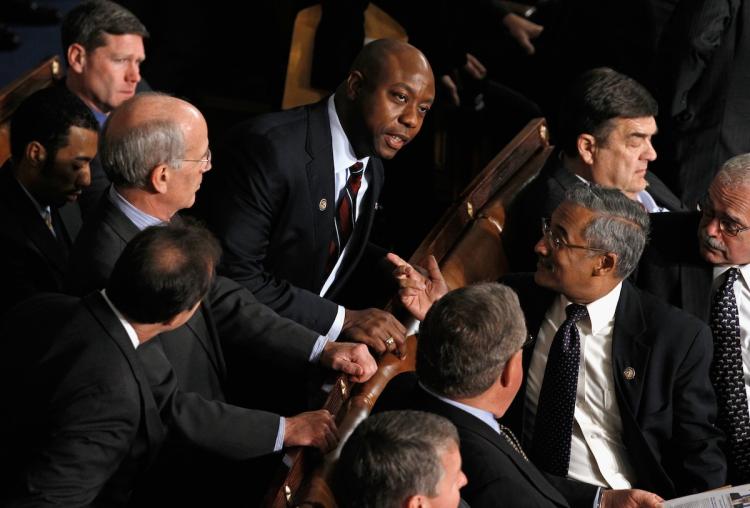Less than two years after an offhand televised remark by CNBC editor Rick Santelli referencing the Boston Tea Party of 1773 blossomed into a full fledged grass-roots movement, a sizable contingent of followers have succeeded in changing business as usual in the House of Representatives.
With a narrowly defined agenda aimed at changing business as usual, and an unusually high level of engagement on the part of “ordinary” Americans across the nation, the group’s power has now officially stepped up from public fields, parking lots, and community centers to the seat of the nation’s capital.
The new House sworn in on Wednesday consisted of over 40 self-identified Tea Party members.
And along with a transfer of power in the House to the new Republican majority, comes a new set of rules, one that clearly shows the Republican leadership is listening to the Tea Party.
In turn, the rules package has earned an endorsement from Tea Party Caucus leader Michele Bachmann (R-Minn.). Her media spokesperson Doug Sachtleben says Bachmann “is very satisfied with the first days of the new Congress.”
In his first speech as House speaker, John Boehner (R-Ohio) claimed his party’s rules package would change how the institution operates.
We will put an “emphasis on real transparency, accountability, and a renewed focus on our Constitution,” he said.
Although Tea Party demands vary, most stand for fiscal responsibility, constitutionally limited government, and free markets. The Tea Party patriots, representing over 1,000 local groups, each with members numbering in the hundreds, claims to be the official home of the movement.
The Republican rules package, passed into law last week, requires that all new legislation originating in the House include a statement of constitutional authority, and just to drive the point home, on Thursday, House representatives took turns reading portions of the Constitution aloud.
“Congresswoman Bachmann was delighted to see the first-ever reading of the U.S. Constitution on the House floor. She believes that last November’s election was a call for a Congress that is committed to govern by constitutional principles, and the reading of the Constitution put an exclamation point on that commitment,” said Sachtleben.
In another gesture, Republicans voted to reduce each member’s office budget by 5 percent, a move seen largely as symbolic due to its estimated ability to trim just $35 million from overall spending.
Responses to the first week of Congress have not been all positive. Some Tea Party activists are already threatening primaries challenges if Republicans fail to deliver on a campaign promise to cut $100 billion from the budget.
A budget showdown will occur early this spring, with the expiration of a continuing resolution, as well as a necessary vote to raise the debt ceiling. Congress will face a disastrous government loan default if they fail to raise the debt allowance, now capped at $14.3 trillion.
But Republicans have also engineered for themselves some serious leverage power.
Republican House rules now require lawmakers to go on record with a vote either for or against raising the debt limit. In the past, Congress approved debt limits automatically, as part of a budget resolution.
The White House, which would bear the majority of the fallout in the event of an unprecedented default, has already issued warnings.
“If we hit the debt ceiling, that’s essentially defaulting on our obligations, which is totally unprecedented in American history,” said Council of Economic Advisers Chairman Austan Goolsbee on ABC’s “This Week” recently.
A few lawmakers, including Bachmann, have said they will not support an increase.
Tea Party affiliated Allen West (R-Fla.), said in a statement that his first priorities would be “turning around this disastrous economy” and limiting government spending. It is unclear whether he would risk a government shutdown to defend his priorities.
House Republicans were planning to vote on a campaign promise and Tea Party endorsed issue of repealing the health care law this week, but the shooting tragedies involving Congresswoman Gabrielle Giffords led to the cancellation of all legislative business until further notice.
With a narrowly defined agenda aimed at changing business as usual, and an unusually high level of engagement on the part of “ordinary” Americans across the nation, the group’s power has now officially stepped up from public fields, parking lots, and community centers to the seat of the nation’s capital.
The new House sworn in on Wednesday consisted of over 40 self-identified Tea Party members.
And along with a transfer of power in the House to the new Republican majority, comes a new set of rules, one that clearly shows the Republican leadership is listening to the Tea Party.
In turn, the rules package has earned an endorsement from Tea Party Caucus leader Michele Bachmann (R-Minn.). Her media spokesperson Doug Sachtleben says Bachmann “is very satisfied with the first days of the new Congress.”
In his first speech as House speaker, John Boehner (R-Ohio) claimed his party’s rules package would change how the institution operates.
We will put an “emphasis on real transparency, accountability, and a renewed focus on our Constitution,” he said.
Although Tea Party demands vary, most stand for fiscal responsibility, constitutionally limited government, and free markets. The Tea Party patriots, representing over 1,000 local groups, each with members numbering in the hundreds, claims to be the official home of the movement.
The Republican rules package, passed into law last week, requires that all new legislation originating in the House include a statement of constitutional authority, and just to drive the point home, on Thursday, House representatives took turns reading portions of the Constitution aloud.
“Congresswoman Bachmann was delighted to see the first-ever reading of the U.S. Constitution on the House floor. She believes that last November’s election was a call for a Congress that is committed to govern by constitutional principles, and the reading of the Constitution put an exclamation point on that commitment,” said Sachtleben.
In another gesture, Republicans voted to reduce each member’s office budget by 5 percent, a move seen largely as symbolic due to its estimated ability to trim just $35 million from overall spending.
Responses to the first week of Congress have not been all positive. Some Tea Party activists are already threatening primaries challenges if Republicans fail to deliver on a campaign promise to cut $100 billion from the budget.
A budget showdown will occur early this spring, with the expiration of a continuing resolution, as well as a necessary vote to raise the debt ceiling. Congress will face a disastrous government loan default if they fail to raise the debt allowance, now capped at $14.3 trillion.
But Republicans have also engineered for themselves some serious leverage power.
Republican House rules now require lawmakers to go on record with a vote either for or against raising the debt limit. In the past, Congress approved debt limits automatically, as part of a budget resolution.
The White House, which would bear the majority of the fallout in the event of an unprecedented default, has already issued warnings.
“If we hit the debt ceiling, that’s essentially defaulting on our obligations, which is totally unprecedented in American history,” said Council of Economic Advisers Chairman Austan Goolsbee on ABC’s “This Week” recently.
A few lawmakers, including Bachmann, have said they will not support an increase.
Tea Party affiliated Allen West (R-Fla.), said in a statement that his first priorities would be “turning around this disastrous economy” and limiting government spending. It is unclear whether he would risk a government shutdown to defend his priorities.
House Republicans were planning to vote on a campaign promise and Tea Party endorsed issue of repealing the health care law this week, but the shooting tragedies involving Congresswoman Gabrielle Giffords led to the cancellation of all legislative business until further notice.






